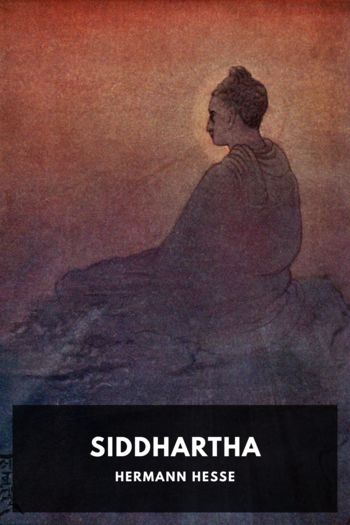Siddhartha - Hermann Hesse (reading books for 5 year olds txt) 📗

- Author: Hermann Hesse
Book online «Siddhartha - Hermann Hesse (reading books for 5 year olds txt) 📗». Author Hermann Hesse
“Pardon me.” he said, “from a friendly heart, I’m talking to you. I’m seeing that you are tormenting yourself, I’m seeing that you’re in grief. Your son, my dear, is worrying you, and he is also worrying me. That young bird is accustomed to a different life, to a different nest. He has not, like you, ran away from riches and the city, being disgusted and fed up with it; against his will, he had to leave all this behind. I asked the river, O friend, many times I have asked it. But the river laughs, it laughs at me, it laughs at you and me, and is shaking with laughter at our foolishness. Water wants to join water, youth wants to join youth, your son is not in the place where he can prosper. You too should ask the river; you too should listen to it!”
Troubled, Siddhartha looked into his friendly face, in the many wrinkles of which there was incessant cheerfulness.
“How could I part with him?” he said quietly, ashamed. “Give me some more time, my dear! See, I’m fighting for him, I’m seeking to win his heart, with love and with friendly patience I intend to capture it. One day, the river shall also talk to him, he also is called upon.”
Vasudeva’s smile flourished more warmly. “Oh yes, he too is called upon, he too is of the eternal life. But do we, you and me, know what he is called upon to do, what path to take, what actions to perform, what pain to endure? Not a small one, his pain will be; after all, his heart is proud and hard, people like this have to suffer a lot, err a lot, do much injustice, burden themselves with much sin. Tell me, my dear: you’re not taking control of your son’s upbringing? You don’t force him? You don’t beat him? You don’t punish him?”
“No, Vasudeva, I don’t do anything of this.”
“I knew it. You don’t force him, don’t beat him, don’t give him orders, because you know that ‘soft’ is stronger than ‘hard,’ water stronger than rocks, love stronger than force. Very good, I praise you. But aren’t you mistaken in thinking that you wouldn’t force him, wouldn’t punish him? Don’t you shackle him with your love? Don’t you make him feel inferior every day, and don’t you make it even harder on him with your kindness and patience? Don’t you force him, the arrogant and pampered boy, to live in a hut with two old banana-eaters, to whom even rice is a delicacy, whose thoughts can’t be his, whose hearts are old and quiet and beat in a different pace than his? Isn’t he forced, isn’t he punished by all this?”
Troubled, Siddhartha looked to the ground. Quietly, he asked: “What do you think I should do?”
Quoth Vasudeva: “Bring him into the city, bring him into his mother’s house, there’ll still be servants around, give him to them. And when there aren’t any around any more, bring him to a teacher, not for the teachings’ sake, but so that he shall be among other boys, and among girls, and in the world which is his own. Have you never thought of this?”
“You’re seeing into my heart,” Siddhartha spoke sadly. “Often, I have thought of this. But look, how shall I put him, who had no tender heart anyhow, into this world? Won’t he become exuberant, won’t he lose himself to pleasure and power, won’t he repeat all of his father’s mistakes, won’t he perhaps get entirely lost in Sansara?”
Brightly, the ferryman’s smile lit up; softly, he touched Siddhartha’s arm and said: “Ask the river about it, my friend! Hear it laugh about it! Would you actually believe that you had committed your foolish acts in order to spare your son from committing them too? And could you in any way protect your son from Sansara? How could you? By means of teachings, prayer, admonition? My dear, have you entirely forgotten that story, that story containing so many lessons, that story about Siddhartha, a Brahmin’s son, which you once told me here on this very spot? Who has kept the Samana Siddhartha safe from Sansara, from sin, from greed, from foolishness? Were his father’s religious devotion, his teachers warnings, his own knowledge, his own search able to keep him safe? Which father, which teacher had been able to protect him from living his life for himself, from soiling himself with life, from burdening himself with guilt, from drinking the bitter drink for himself, from finding his path for himself? Would you think, my dear, anybody might perhaps be spared from taking this path? That perhaps your little son would be spared, because you love him, because you would like to keep him from suffering and pain and disappointment? But even if you would die ten times for him, you would not be able to take the slightest part of his destiny upon yourself.”
Never before had Vasudeva spoken so many words. Kindly, Siddhartha thanked him, went troubled into the hut, could not sleep for a long time. Vasudeva had told him nothing, he had not already thought and known for himself. But this was a knowledge he could not act upon, stronger than the knowledge was his love for the boy, stronger was his tenderness, his fear to lose him. Had he ever lost his heart so much to something, had he ever loved any person thus, thus blindly, thus sufferingly, thus unsuccessfully, and yet thus happily?
Siddhartha could not heed his friend’s advice, he could not give





Comments (0)